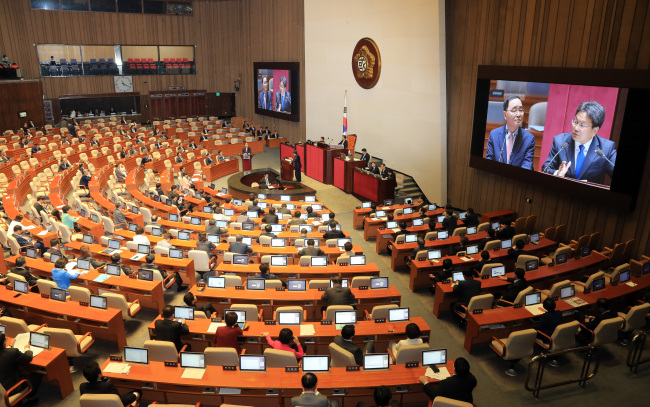새누리당은 14일 민주당이 인사청문회를 제외한 사흘간의 보이콧을 끝내고 국회일정에 복귀한 것을 환영하면서도 국회 선진화법 개정 필요성을 거듭 제기하며 야당의 정기국회 협조를 압박했다.
특히 2010년 지방선거에서 민주당 이교범 하남시장과 통합진보당(이하 진보당) 김근래 경기도당 부위원장 간의 단체장 운영권 및 제정지원 등을 매개로 한 후보단 일화 이면합의 의혹을 불쏘시개로 민주당과 정의당, 무소속 안철수 의원 등의 신야 권연대를 '야합연대'라며 거세게 몰아붙였다.
야당의 정략적 반대와 국회 선진화법에 발목이 잡혀 국회가 제대로 운영되지 않는 점을 강조함으로써 야당과 선진화법의 문제점을 동시에 부각하는 한편, 내년 6월 지방선거를 앞두고 꿈틀거리는 신야권연대에 대해 집중포화를 퍼부었다.
유기준 최고위원은 "선진화법은 대화와 타협을 통한 효율적 국회 운영이 그 취지인데 지금은 소수당이 국회를 지배하고 다수당은 지켜볼 수밖에 없는 처지"라면서 "근본적으로 위헌 소지가 있는 것으로 생각된다. 선진화법을 개정하거나 위헌심판 제청을 해야 한다"고 주장했다.
윤상현 원내수석부대표는 "2012년 선진화법을 처리할 때 저도 반대를 하다 '우선 처리하고 부작용이 생기면 바꾸자'는 설득력 없는 논리에 설득당하는 잘못을 저 질렀다"고 '고백'하면서 "뒤틀린 의회민주주의를 다시 세워야 하고, 이름만 선진화 법인국회 선진화법을 전면 재검토하고 국민 여론 수렴에 나서야 한다"고 강조했다.
이처럼 새누리당이 선진화법 손질을 위해 국회법 개정과 헌법소원의 투트랙 전 략을 구사할 움직임을 보이면서 이것이 당내 논란의 불씨가 되는 것 아니냐는 우려도 나온다. 선진화법은 황우여 대표가 주도한 법안으로 알려져 있어서다.
이런 가운데 최경환 원내대표와 정우택 최고위원은 민주당과 진보당의 후보단일 화 이면합의 의혹을 지렛대 삼아 신야권연대을 맹비판했다.
최 원내대표는 "검찰이 민주당 소속 이교범 하남시장과 RO(혁명조직) 핵심인 김 근래 진보당 경기도당 부위원장 간의 이면합의 문건을 확보해 조사 중"이라면서 "만일 밀실 뒷거래 보도가 사실이라면 나눠먹기식 야합이 종북정당의 숙주 노릇 부작용으로 드러난 충격적 결과"라고 주장했다.
그는 신야권연대를 '신야합연대'라고 비판했다
정 최고위원도 "사실로 드러날 경우 종북세력이 국회뿐 아니라 국민 생활권 곳곳에 뿌리내리게 지원하는 천인공노할 불법을 저지른 것과 다름없다"고 지적했다.
유수택 최고위원은 "신야권연대가 열리는 순간 민주당은 제1야당임을 스스로 포기하고 25%의 지분을 가진 자회사로 전락하고 말 것"이라고 꼬집었다.
김기현 정책위의장은 "민주당은 민생을 내팽개치는 '민생방치', 툭하면 길거리로 뛰쳐나가는 '길치', 가벼운 입으로 정치의 품격을 땅에 떨어뜨리고 불필요한 시비를 불러일으키는 '세치', 사사건건 발목을 잡아 대치정국을 만드는 '대치정치'의 '4치 정치'를 하고 있다"고 비판했다.
<관련 영문 기사>
Saenuri moves to revise National Assembly Act
By Choi He-suk
The ruling Saenuri Party and the main opposition Democratic Party are readying for a new round of battles over next year’s government budget and the so-called National Assembly advancement act.
The National Assembly advancement act, introduced last year, stipulates that tightly contested issues require the agreement of more than 60 percent of lawmakers. The clause, which was supported by Saenuri Party chairman Rep. Hwang Woo-yea and President Park Geun-hye, prevents the ruling party from pushing through legislation despite holding 155 of the 300 seats.
On Wednesday, Saenuri Party floor leader Rep. Choi Kyung-hwan said that a revised bill will be proposed in the near future as the act has been proven to be unsuitable to Korea due to the presence of an “obstinate opposition party.”
Choi’s call to revise the act was taken up by other lawmakers on Thursday.
“Despite the pure intentions of those who led the National Assembly advancement act who wanted to make a violence-free parliament, an act for incapacitating the National Assembly was made,” Saenuri Party deputy floor leader Rep. Yoon Sang-hyun said, adding that he and other lawmakers were misled.
“The assembly democracy that was twisted in April and May 2012 needs to be corrected. The National Assembly advancement act must be subjected to a complete review.”
The DP for its part hit back at the Saenuri Party, accusing it of trying to lay the groundwork for rushing through legislation.
“Saenuri Party’s move to revise the National Assembly advancement act is a recurrence of its snatch-instinct,” DP floor leader Rep. Jun Byung-hun said.
He added that introducing the National Assembly advancement act was the ruling party’s idea, and that the Saenuri Party is overreacting despite the act never having taken effect.
“The Saenuri Party is responsible for stopping parliamentary investigations, hampering parliamentary audits and protecting the NIS. But, (the ruling party) is putting all the blame on the opposition party, and threatening and pressuring the opposition party.”
While a new row brews over the National Assembly Act, the DP is gearing up to make significant cuts to the government’s budget plans, particularly on funds allocated to what it calls “Park Geun-hye brand” projects. Projects that have been categorized as “Park Geun-hye brand” include the Saemaul Movement and the demilitarized zone peace park. The former has been allocated 22.7 billion won ($21.3 million), and the latter 40.2 billion won.
Other projects the DP plans to make significant cuts to include a number of creative economy-related programs and funding for the so-called “power organizations.” The power organizations refer to government organs with investigative powers including the National Intelligence Service, police and prosecution, and the National Tax Service.
(
cheesuk@heraldcorp.com)







![[Exclusive] Hyundai Mobis eyes closer ties with BYD](http://res.heraldm.com/phpwas/restmb_idxmake.php?idx=644&simg=/content/image/2024/11/25/20241125050044_0.jpg)
